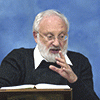Methods of Transferring Information
 Question: What makes the spoken Kabbalistic language different from the written?
Question: What makes the spoken Kabbalistic language different from the written?
Answer: Spoken language, unlike the written language, can convey much more, on one hand, and on the other hand, written language can convey more than the spoken language.
After all, written language is not just the language we use today; there were many other additional symbols in it. People used it for a long time until it was all erased and forgotten. Our great teacher Yehuda Ashlag (Baal HaSulam) speaks a little about this.
Spoken and written languages are different ways of passing on information. But in general, of course, everything is passed on in written language, especially in our time.
But it was not so before. At one time, written language was used very little since information was mainly passed on orally and memorized. For example, if I hear something from my teacher, I just memorize what he says literally. Gradually, I start to understand these words and begin to understand what I have received from him.
Question: Was it so because much more can be conveyed through oral speech?
Answer: Not only because of that, but because the information was not written down. It was forbidden to simply write it down. That is why there is the oral Torah and the written Torah.
The oral Torah is much deeper and much higher than the written one. It talks about connection with the Creator. The written one is only what we can write down, what we can indicate, what we can understand and comprehend today.
A true Kabbalist can read texts and see all kinds of words between the lines; that is, certain information that was intended to be passed orally, but was not written down.
[301360]
From KabTV’s “Spiritual States” 7/26/22
Related Material:
The Difference Between Oral and Written Torah
Transfer Of Information In Kabbalah
Annul Yourself Before The Teacher







Discussion | Share Feedback | Ask a question